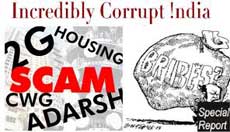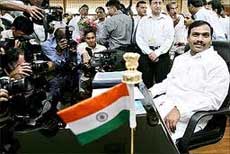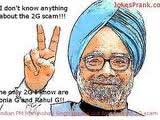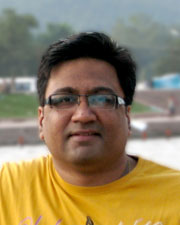 Consequent to the India's current state of affairs with respect to Corruption and Misgovernance, even the 'Snow' has turned Black—the obvious have also lost its credibility.
Consequent to the India's current state of affairs with respect to Corruption and Misgovernance, even the 'Snow' has turned Black—the obvious have also lost its credibility.BUY NOW
Republic of Procrastinating India
 Indus civilization (3300 BC) in one of the oldest and richest civilization of all times. India is tipped to be the superpower in coming years. Indus civilization (3300 BC) in one of the oldest and richest civilization of all times. India is tipped to be the superpower in coming years. Being the seventh largest country by geographical area, the second most populous country, and the most populous democracy of the world, the dream seems realistic. Four of the world’s major religions—Hinduism, Buddhism, Jainism and Sikhism-–originated here, while Zoroastrianism, Christianity and Islam arrived in the first millennium. After being colonized by the United Kingdom for more than 200 years, India got independence in 1947 after many freedom fighters laid their lives to attain the secular, democratic and socialist republic for the coming generations.
Indus civilization (3300 BC) in one of the oldest and richest civilization of all times. India is tipped to be the superpower in coming years. Indus civilization (3300 BC) in one of the oldest and richest civilization of all times. India is tipped to be the superpower in coming years. Being the seventh largest country by geographical area, the second most populous country, and the most populous democracy of the world, the dream seems realistic. Four of the world’s major religions—Hinduism, Buddhism, Jainism and Sikhism-–originated here, while Zoroastrianism, Christianity and Islam arrived in the first millennium. After being colonized by the United Kingdom for more than 200 years, India got independence in 1947 after many freedom fighters laid their lives to attain the secular, democratic and socialist republic for the coming generations.  The Indian economy is the world’s tenth largest economy by nominal GDP and fourth largest economy by purchasing power parity (PPP). A nuclear weapons state and a regional power, it has the third largest standing army of the world, and ranks tenth in the military expenditure in the world. India is a pluralistic, multilingual, and multiethnic society. It is also a home to a diversity of wildlife in a variety of protected habitats. Aryabhata I (Astronomer) first stated that the earth is a sphere and it rotates on its axis. Asvin Kumars (Physician), twin sons of Vivaswat and Saranyu, were celebrated as 'divine physicians' of Vedic period. Baudhayana (Mathematician–Geometrician) was the first great geometrician of the Vedic altars. The science of geometry originated in India in connection with the construction of the altars of the Vedic sacrifices. Brahmagupta (Mathematician) was the most distinguished mathematician of India who gave zero its status. He composed Brahma-Sphuta-Siddhanta, which dealt with algebra, arithmetic, geometry and astronomy. Charaka (Physician) is regarded as the principal exponent of the medical system known as 'Kayachikitsa'. He composed Charaka Samhita, which is the earliest medical treatise recognized in India. The work reveals the author's extensive knowledge of plant, mineral, and animal resources for treatment of diseases. Dhanwantari (Physician) taught surgery to Sustruta. He was the god of classical Indian medicine and is still held in high esteem. Medhatithi (Mathematician) name is associated with 313 verses of Rig Vedic hymns. His greatest contribution to the science of numerals is the concept of powers of ten in enumeration. Nimi (Ophthalmologist) was said to have identified 76 eye diseases. His valuable details concerning eye diseases are mentioned in several standard medical treatises. Sushruta (Surgeon) was the son of Visvamitra and belonged to the Himalayan region. He is considered as the 'Father of Indian Surgery' and the compiler of the first classical book of Indian surgery 'Sushruta-Samhita'. The science of transplanting sensible skin flap is entirely an Indian method, which is evident from 'Sushruta-Samhita' (Sutrasthanam Ch.XVI). His practice to give medicated wine to patients before surgery in order to numb his senses makes him an expert in anaesthesia. Sushruta described a novel method of stitching the wound after operation, by using ant-heads as stitching material. 'Sushruta-Samhita' was translated in to Arabic as Kitab-Shaw Shoon-a-Hindi and Kitab-I-Susrud. Varahamihira (Astronomer & Astrologer) was the best known and the most respected astrologer of India. He was an authority on the Brahama-Sphuta Siddhanta of Brahmagupta. He contributed many important works namely Panchasiddhantika, Brhat Samhita, Sama Samhita, etc. Among all these treatises, Panchasiddhantika is the one of great repute. The Brhat Samhita described four types of earthquakes as 'Vayumandal', 'Agnimandal', 'Indramandal', and 'Varunamandal'. He also gave 'Bhukamp Lakshan' for these four types of earthquakes.
The Indian economy is the world’s tenth largest economy by nominal GDP and fourth largest economy by purchasing power parity (PPP). A nuclear weapons state and a regional power, it has the third largest standing army of the world, and ranks tenth in the military expenditure in the world. India is a pluralistic, multilingual, and multiethnic society. It is also a home to a diversity of wildlife in a variety of protected habitats. Aryabhata I (Astronomer) first stated that the earth is a sphere and it rotates on its axis. Asvin Kumars (Physician), twin sons of Vivaswat and Saranyu, were celebrated as 'divine physicians' of Vedic period. Baudhayana (Mathematician–Geometrician) was the first great geometrician of the Vedic altars. The science of geometry originated in India in connection with the construction of the altars of the Vedic sacrifices. Brahmagupta (Mathematician) was the most distinguished mathematician of India who gave zero its status. He composed Brahma-Sphuta-Siddhanta, which dealt with algebra, arithmetic, geometry and astronomy. Charaka (Physician) is regarded as the principal exponent of the medical system known as 'Kayachikitsa'. He composed Charaka Samhita, which is the earliest medical treatise recognized in India. The work reveals the author's extensive knowledge of plant, mineral, and animal resources for treatment of diseases. Dhanwantari (Physician) taught surgery to Sustruta. He was the god of classical Indian medicine and is still held in high esteem. Medhatithi (Mathematician) name is associated with 313 verses of Rig Vedic hymns. His greatest contribution to the science of numerals is the concept of powers of ten in enumeration. Nimi (Ophthalmologist) was said to have identified 76 eye diseases. His valuable details concerning eye diseases are mentioned in several standard medical treatises. Sushruta (Surgeon) was the son of Visvamitra and belonged to the Himalayan region. He is considered as the 'Father of Indian Surgery' and the compiler of the first classical book of Indian surgery 'Sushruta-Samhita'. The science of transplanting sensible skin flap is entirely an Indian method, which is evident from 'Sushruta-Samhita' (Sutrasthanam Ch.XVI). His practice to give medicated wine to patients before surgery in order to numb his senses makes him an expert in anaesthesia. Sushruta described a novel method of stitching the wound after operation, by using ant-heads as stitching material. 'Sushruta-Samhita' was translated in to Arabic as Kitab-Shaw Shoon-a-Hindi and Kitab-I-Susrud. Varahamihira (Astronomer & Astrologer) was the best known and the most respected astrologer of India. He was an authority on the Brahama-Sphuta Siddhanta of Brahmagupta. He contributed many important works namely Panchasiddhantika, Brhat Samhita, Sama Samhita, etc. Among all these treatises, Panchasiddhantika is the one of great repute. The Brhat Samhita described four types of earthquakes as 'Vayumandal', 'Agnimandal', 'Indramandal', and 'Varunamandal'. He also gave 'Bhukamp Lakshan' for these four types of earthquakes.  Surprised that why am I telling you all this? What happens when you feel low, experience alternating feelings of elation and gloom? Don't you go back to your good times to recall those days and regain the lost pride by denouncing your achievements and hardships in achieving them. I am trying to do the same thing here—trying to regain the lost pride of the feeling to be an Indian. May be we all know an actor’s first movie, but are absolutely heedless of the India’s firsts as a priceless contribution to the entire human fraternity. I kept on thinking what have had happened of these contributions if the protagonists had procrastinated? Where we would have been if Mangal Pandey had procrastinated on the first mutiny for independence? What would have been the scenario if Rani Lakshmi Bai would have deferred her moves to oust the British rulers? How could we had any reason to cheer if Lal-Bal-Pal, Mahatma Gandhi, Nehru, Sardar Patel, Bhagat Singh, Rajguru, Sukhdev had thought to relax, take their own time, and live on the glorious Indian history to procrastinate till some time further? Just a mere thought of it, sends a chill down my spine and I immediately switch on my TV in anticipation to hear some good news that could regain my belief in the democracy of the country. But to my and all our fellow citizens’ disbelief, it seldom happens. Scams, mismanagement, vote bank politics and similar news fall on our cochleae out of the Dolby speakers. We get more confused as to till when we have to live with it; till when we would be deprived of some good news that can elate our souls and revive our trust in ourselves, leave apart the trust in the country’s leadership. We change channels to search for a channel by the name ‘Positive’ or a digital place showing some genuine smiling faces. Unable to track down one, we let our jaws drop on the ultimate reality we face on daily basis even without acknowledging it.
Surprised that why am I telling you all this? What happens when you feel low, experience alternating feelings of elation and gloom? Don't you go back to your good times to recall those days and regain the lost pride by denouncing your achievements and hardships in achieving them. I am trying to do the same thing here—trying to regain the lost pride of the feeling to be an Indian. May be we all know an actor’s first movie, but are absolutely heedless of the India’s firsts as a priceless contribution to the entire human fraternity. I kept on thinking what have had happened of these contributions if the protagonists had procrastinated? Where we would have been if Mangal Pandey had procrastinated on the first mutiny for independence? What would have been the scenario if Rani Lakshmi Bai would have deferred her moves to oust the British rulers? How could we had any reason to cheer if Lal-Bal-Pal, Mahatma Gandhi, Nehru, Sardar Patel, Bhagat Singh, Rajguru, Sukhdev had thought to relax, take their own time, and live on the glorious Indian history to procrastinate till some time further? Just a mere thought of it, sends a chill down my spine and I immediately switch on my TV in anticipation to hear some good news that could regain my belief in the democracy of the country. But to my and all our fellow citizens’ disbelief, it seldom happens. Scams, mismanagement, vote bank politics and similar news fall on our cochleae out of the Dolby speakers. We get more confused as to till when we have to live with it; till when we would be deprived of some good news that can elate our souls and revive our trust in ourselves, leave apart the trust in the country’s leadership. We change channels to search for a channel by the name ‘Positive’ or a digital place showing some genuine smiling faces. Unable to track down one, we let our jaws drop on the ultimate reality we face on daily basis even without acknowledging it.  We have no one to talk to at the helm of the country’s affairs about the country. We wait for someone to come out of the closet and talk about the country’s vision, mission and ways to achieve it—but we are left disappointed. We await someone to reach out to us through any modern-age mediums to let our minds get a warm feeling of being protected and caressed—but we are again left unattended. We try to see someone on the other side of the curtain, but don’t find anyone peeping out at us. We await some concrete actions to be heard, visited, and seen on the pranksters who have duped the country and drained significant part of its financial capital—but we are left disillusioned. The country’s leaders are busy in counting the bands of the ‘2G Spectrum’; apportionating the common wealth earned out of ‘Commonwealth’; hiding the ‘satya’ of the ‘Satyam’; trying hard to hide the canon balls of ‘Bofors’; distributing ‘fodder’ amongst themselves; trying to hit ‘Hawala’ off the ground while ‘IPL’ bowls—many of us have died in anticipation of living in real India we have ever dreamt of. We are forced to survive in the modern age ‘virtual’ India where inspite of having the fugitives in hand, we serve them food; inspite of having our hands on the criminals, we stitch their dresses; inspite of the citizens shouting—Thief, Thief, we arrest the Police. We have become a state of procrastination and are in habit of delaying things as it aids those who delay them.
We have no one to talk to at the helm of the country’s affairs about the country. We wait for someone to come out of the closet and talk about the country’s vision, mission and ways to achieve it—but we are left disappointed. We await someone to reach out to us through any modern-age mediums to let our minds get a warm feeling of being protected and caressed—but we are again left unattended. We try to see someone on the other side of the curtain, but don’t find anyone peeping out at us. We await some concrete actions to be heard, visited, and seen on the pranksters who have duped the country and drained significant part of its financial capital—but we are left disillusioned. The country’s leaders are busy in counting the bands of the ‘2G Spectrum’; apportionating the common wealth earned out of ‘Commonwealth’; hiding the ‘satya’ of the ‘Satyam’; trying hard to hide the canon balls of ‘Bofors’; distributing ‘fodder’ amongst themselves; trying to hit ‘Hawala’ off the ground while ‘IPL’ bowls—many of us have died in anticipation of living in real India we have ever dreamt of. We are forced to survive in the modern age ‘virtual’ India where inspite of having the fugitives in hand, we serve them food; inspite of having our hands on the criminals, we stitch their dresses; inspite of the citizens shouting—Thief, Thief, we arrest the Police. We have become a state of procrastination and are in habit of delaying things as it aids those who delay them.  God forbid! If someday, another East India Company unfurls its flag again—people with thousands of crores of free kickbacks in their Swiss accounts will flee the country and we with few thousands of the hard-earned salary would be left behind to fight another 200 years of freedom struggle for another ‘Republic of Procrastinating India’.
God forbid! If someday, another East India Company unfurls its flag again—people with thousands of crores of free kickbacks in their Swiss accounts will flee the country and we with few thousands of the hard-earned salary would be left behind to fight another 200 years of freedom struggle for another ‘Republic of Procrastinating India’.

